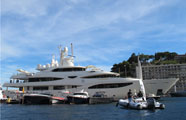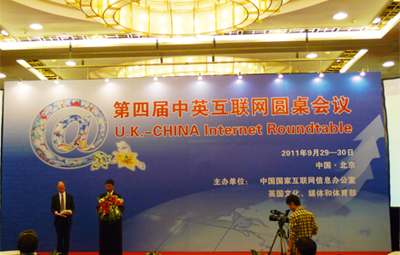Tourism industry on a high in Dunhuang
Updated: 2011-09-30 09:19
By Lu Chang (China Daily)
|
|||||||||
Once a melting pot of the exotic culture brought by foreign merchants, monks and soldiers, Dunhuang is now seeing an upsurge of foreign and domestic tourists.
"Today was the day which made me feel that I was really traveling the Silk Road," says Robert Bunkin, a modern-day pilgrim. The backpacker from the United States has followed the footsteps of the ancient traders and pilgrims and made a trip through the passage of the Silk Road from Xi'an to Dunhuang.
"I felt pleased that I came here during my lifetime," says Bunkin, standing next to the Crescent Moon Lake, a vital source of water in the oasis for thousands. "I have never seen anything quite like it. The best part is that it is not man-made. It's a naturally occurring oasis."
Dunhuang, the only oasis on the edge of the Gobi Desert between Central Asia and the ancient capital of Xi'an (then called Chang'an), has played host to almost 1.54 million visitors from January to August this year, a surge of 40.89 percent from last year.
The number of foreign visitors coming to Dunhuang topped 40,000 in the same period, with the United States becoming one of the largest overseas tourist sources after South Korea and Japan, according to data from the city tourism administration.
Li Xinmin, head of Dunhuang tourism administration, says the reason for such an increase is the building of new facilities, intense publicity of Dunhuang, more themed tourism products and improved services that enhance visitor experience.
"In recent years, we have been developing more tourism products using cultural cards such as the ancient Silk Road and ancient Great Wall tours, which help tourists have more cultural and tourism experiences," says Li. "We will continue to highlight our research and development and in-depth promotions of Dunhuang tourism products."
Tourism is Dunhuang's main industry, accounting for nearly 55 percent of the local gross domestic product. Tourism industry income of the city hit 1.3 billion yuan ($203 million) in the first eight months of this year, up 107.5 percent over the same period last year.
"Dunhuang was once an important town along the ancient Silk Road linking Central Asia with China," says the city's Party secretary Sun Yulong. "It now has 241 historical sites, including the Mogao Grottoes, Mingsha Hill, and Crescent Moon Lake, which are appreciated by more and more foreigners."
Dunhuang plans to invest 5 billion yuan for about 20 tourism projects, 14 of which are already in the process, to build the city into an international tourist destination with modern facilities by 2015. These projects including the visitor center of the Mogao Grottoes and a five-star hotel is to create stronger staying power for tours that will last for more than two days.
Wagner Wong, an American-Chinese, says he preferred to travel to a place like Dunhuang because the city is like a collection of art interactions of the ancient dynasties.
"The vividness of the color in the Mogao caves was amazing even after many hundreds of years, and the condition and quality of the art work just took my breath away," says Wong, 29. "Unlike many other cities in China, it's a small, ancient and unexplored city, where sand dunes and camels outnumber the local population."
"It's a good place to relax for a few days before returning to the manic life of Beijing."
With more effort being put into the tourism industry, the city is expected to receive more than 2 million people next year.
But Li Xinmin says transport is still a bottleneck restricting the development of the tourism industry.
Only six airlines connect Dunhuang to 10 cities on 13 routes, while the Dunhuang Airport has at most 30 flights a day at the peak seasons.
"We still have a lot to do in terms of new facilities, such as high-end hotels and scenic spot infrastructure and transportation and existing tourism service system," says Li. "I think with more flights opened in the future, we will see a lot more tourists coming from overseas."










